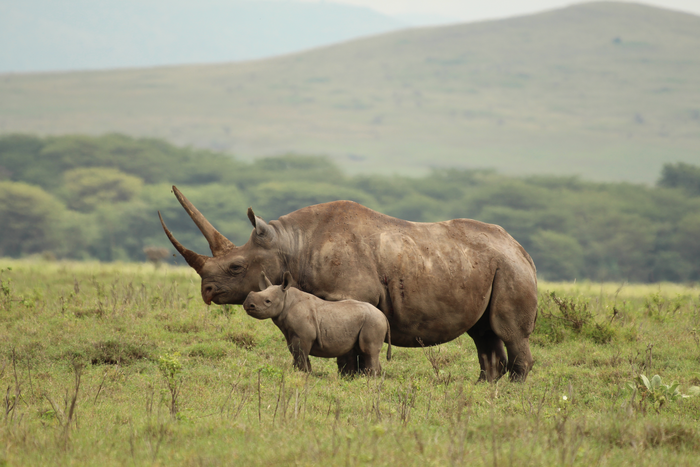New research from The University of Manchester, in collaboration with Kenyan conservationists and scientists, has examined data from the Critically Endangered Kenyan black rhino populations which suggest that individuals really matter when assessing the impact of poaching on species’ survival chances.

Credit: Rhinos in Kenya – Credit, Nick Harvey Sky
New research from The University of Manchester, in collaboration with Kenyan conservationists and scientists, has examined data from the Critically Endangered Kenyan black rhino populations which suggest that individuals really matter when assessing the impact of poaching on species’ survival chances.
The research published today in journal, Proceedings of the Royal Society B, demonstrates that poaching combined with individual rhino’s reproductive variance, or how successful mums are at raising young, leads to a greater than first thought risk to the survival of the black rhino.
In the case of these rhino, reproductive variance increased extinction risk by as much as 70% when combined with poaching.
Within black rhino populations (and most likely in most animals), some individuals have more babies than others. This variation increases existing estimates of extinction risk, especially when there is poaching. This is because indiscriminate killing can lead to some of these important animals which contribute a greater number of offspring being removed.
Susanne Shultz, Professor of Evolutionary Ecology and conservation at The University of Manchester said: “Preventing population declines is a crucial step for stopping biodiversity loss. In this study, we identified how losing key rhinos can make small populations very vulnerable, which can help us design more effective conservation actions.”
The new research is important because it shows that we may underestimate risk (or overestimate viability) if we do not recognise that some individuals contribute a lot more to the population (and their loss will have a much bigger impact).
Lead author on the work, Dr Nick Harvey Sky said: “This study shows that poaching has effects on rhinos beyond the death of targeted individuals. The deaths of healthy females that would have gone on to produce lots of calves can make whole populations more vulnerable to extinction.”
Estimating the extinction risk faced by different populations is vital for conservation. This can be affected by differences in breeding success between individual females (called reproductive skew), but reproductive skew is not often included in predictions of future population growth because it requires detailed individual breeding histories.
This information is available for the Critically Endangered eastern black rhino because of intensive monitoring to protect them from poaching. The University of Manchester has collaborated closely with Kenyan rhino managers, scientists and security teams who have meticulously recorded births and deaths for decades. Across three Kenyan populations of black rhinos on Lew Wildlife Conservancy, Ol Pejeta Conservancy and Ol Jogi Wildlife Conservancy, the researchers found that there is significant variation in breeding success between females, with many females not breeding or doing so very slowly.
Dr John Jackson, Post-doctoral researcher at the University of Oxford said: “For me, our study really highlights a deadly combination of small populations, individual differences, and poaching for vulnerable populations. When working in combination, these factors can completely reshape the fate of an endangered species.”
Crucially, variation in female breeding success can exacerbate the effects of poaching, especially on small populations. If key individuals, ones that breed very well, are killed then it can make the whole population more vulnerable to extinction. This highlights how important it is to protect rhinos from poaching. It may be possible to even out the variation in breeding success by creating new rhino reserves, moving rhinos between current reserves, or even creating more valuable habitat, but the causes of reproductive skew must first be identified. Differences between individuals in their contribution of young to at risk populations is likely an issue across many more species and should be evaluated when assessing their risk of extinction.
Journal
Proceedings of the Royal Society B Biological Sciences
DOI
10.1098/rspb.2022.0075
Subject of Research
Animals
Article Title
Female reproductive skew exacerbates the extinction risk from poaching in the eastern black rhino
Article Publication Date
13-Apr-2022




